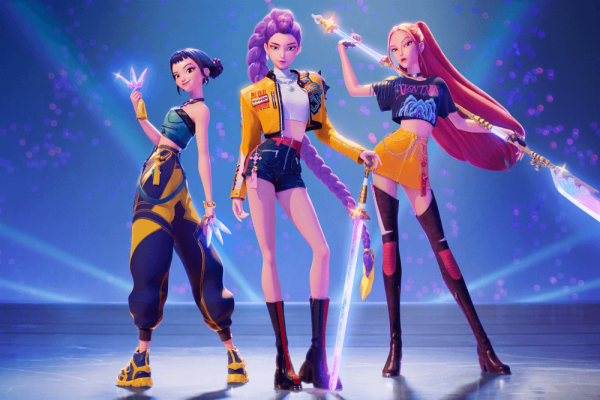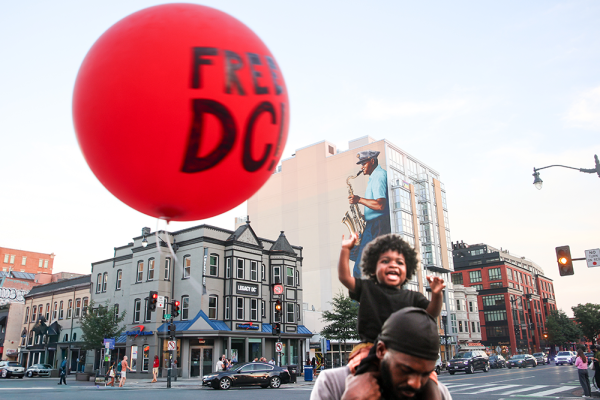Why is it that, in our current era, the most emotionally resonant art often lurks behind the silliest premise? It has become something of a running joke in the rapidly emerging KPop Demon Hunters fan community that the movie, on the basis of the title alone, is incredibly difficult to recommend to people without being laughed off. KPop Demon Hunters may have a campy hook, but it explores ideas that cut to the heart of human experience.
KPop Demon Hunters is about Huntr/x, a trio of Korean singers whose pop star status conceals their true role as mystical demon hunters tasked with creating a supernatural barrier called the Honmoon. Through the power of music, this Honmoon keeps soul-consuming demons at bay from the world. When the evil demon king Gwi-Ma sends a demon boy band called the Saja Boys to fight fire with fire (or pop song with pop song,) our heroes’ defense against the demon army begins to break. And the darkest secret? Rumi, the group’s lead singer and the film’s protagonist, is actually part-demon herself.
Obviously, KPop Demon Hunters is playing with some tropes that are fairly familiar even within the kids’ media space: pop stars with double lives, teenage girls who fight supernatural monsters, and even Rumi’s Frozen-coded “conceal, don’t feel, don’t let them know” mindset toward her demon heritage. Where Demon Hunters distinguishes itself is in its incredibly well-produced music, exuberant animation from the Spider-Verse team, and delightfully dimensional female characters. But most importantly, KPop Demon Hunters is serious about its spiritual and religious undertones, particularly on the subjects of sin, shame, and how we treat those who are different.
In the context of the film, shame—particularly, internalized, private shame—is the fuel that feeds the demon king Gwi-Ma and allows him to invade the minds of human beings and consume their souls. Rumi has felt a sense of shame about her demon heritage from the earliest moment she can remember. Her sense of shame is made manifest in the telltale “patterns” on her skin that mark her as a demon—patterns she always keeps hidden. Raised by her adopted mother Celine, Rumi is told that she is “not one of them” but is instead “a hunter, like [her] mother.” Someday, Celine promises Rumi, the supernatural Honmoon will seal demons away permanently, her patterns will disappear for good, and she can finally live a normal life. Until then, it’s prudent to hide these patterns from everyone.
Rumi’s obsession with literally covering her source of shame with clothing may sound familiar for anyone who has had the slightest brush with the book of Genesis: Adam and Eve, too, found it necessary to “cover up” from basically the moment shame entered the garden. The voices in Rumi’s head often reach even further, telling her that she’s been a mistake ever since she was born. Put another way, that she is fundamentally “sinful” by the nature of her very existence.
Rumi’s story may resonate with anyone who has had any experience with the religious trauma that comes from being told a core part of their identity, such as queerness, neurodivergence, or physical disability, is a sinful stamp. These are significant pieces of self which often receive condemnation in religious circles, prompting individuals to hide or “cover up.”
If you've experienced this kind of shame, you may have even used a religious framework to imagine a future where this piece of identity is finally “healed” or “purified”—a total erasure of the perceived sin. A closeted gay teenager might dream of being somehow “cured” of their “sexual perversions,” or an autistic person might hope for the same sense of “cure” to become “normal” and acceptable in the eyes of both God and the world. Even those of us outside these categories often find ourselves longing to be somehow freed from the things that make us different in a world where “difference” is so often viewed as “defective.”
READ MORE: My Disabled Body Proclaims the Gospel
By following Celine’s advice to hide her patterns until they can finally be erased, Rumi falls into the same mindset of believing that her hope lies in distancing herself from everything she resents about who she is. Rumi’s ideal future is one where her shame is eliminated. But she believes the only way to accomplish this future is by keeping her shame around her identity a secret, never mentioning it to anyone. Within a queer reading, it’s a future where she never has to face coming out of the closet. And the only way to achieve this future? By fighting, singing, and even hating so hard that all demons are destroyed. Midway through the film, Rumi joins her bandmates in throwing herself into writing a “diss track to expose the Saja Boys and send those disgusting demons back to the depths where they belong!” But the more she starts to question the black and white categories she’s been taught, the less her heart is in the song.
I was struck by one conversation Rumi has with her bandmate Mira. Sensing her increasing hesitance, Mira is subtly testing Rumi’s allegiance to the cause: “I can’t wait until every one of them is destroyed and sent back to suffer with Gwi-Ma for eternity. Right, Rumi?” Rumi, in turn, can only muster glum agreement: “Yeah. Eternal suffering. Sounds… fun.”
While the demon hunters’ cause of protecting the world from Gwi-Ma is noble, their identity has slowly become more retributive than restorative—focused on destroying and punishing evil rather than doing good. This obsession, particularly for Rumi, masks an attempt to externalize her shame onto something that will allow her to view it as separate from her.
Fundamentalist theologies are no stranger to this phenomenon. Diana Butler Bass writes about evangelical fundamentalism’s similar penchant for dealing with shame by finding an enemy to cast it upon: “Fundamentalists love to shame others—pointing out hidden sins of the heart, the ‘back alleys’ of rejecting God, and risky rebellion against righteousness … [B]y externalizing shame and casting it on their enemies, fundamentalists become, in effect, shameless, a sense that fuels their own self-righteousness and permits them to bend (or break) the rules to accomplish whatever they believe to be God’s will.”
Rumi’s worldview is ultimately shattered by meeting Jinu, the demon lead-singer of the Saja Boys, who notices her patterns from their first interaction. Jinu calls her out for hiding her own self-loathing behind a hatred of demons: “If hate could defeat Gwi-Ma, I would’ve done it a long time ago.” Together, the two finally begin to bring their full and honest selves into a relationship with another person without hiding. And for the first time, Rumi’s difference is something that connects instead of alienates.
Many of these issues are personal for me. I’m a trans Christian with a few disabled friends, and I’m deeply invested in this conversation around what we, particularly in religious communities, do with difference. Far too often in our subculture, what is outside a conventional, broad mold—whether that mold be Genesis, or 1950s cultural norms—is ascribed to sin, whether conscious or unconscious. As much as we try to tell people that they have nothing to be ashamed of, when part of a person is treated by those in authority as a separate and scary thing, it unavoidably leads to shame. On certain days, I resonate with Rumi’s statement to her mother in a penultimate scene: “If this is the Honmoon I’m supposed to protect, I’m glad to see it destroyed.”
I’ve talked pretty critically about evangelical theologies and religious trauma in this piece, but the climax of KPop Demon Hunters is where I find the film the most truly energizing and life-giving—not just in its penchant to deconstruct, but its desire to reconstruct. As the demon king Gwi-Ma descends on the city and draws everyone into believing lies about themselves, Rumi finally returns to sing a new song.
For those taught—even by implication—to be ashamed of who they are, the lyrics of “What It Sounds Like” can hit like a ton of bricks:
Nothing but the truth now
Nothing but the proof of what I am
The worst of what I came from, patterns I'm ashamed of
Things that even I don't understand
Why did I cover up the colors stuck inside my head?
I should’ve let the jagged edges meet the light instead
Show me what’s underneath, I’ll find your harmony
The song we couldn’t write, this is what it sounds like
We broke into a million pieces, and we can’t go back
But now I’m seeing all the beauty in the broken glass
The scars are part of me, darkness and harmony
My voice without the lies, this is what it sounds like
KPop Demon Hunters isn’t always as crystal clear in its commentary as it could be. Despite the film’s attempt to humanize the demons and break through the black and white categories that the heroes hold, it still ends in a butt-kicking to end all butt-kickings. Even so, the way the film deals with shame is clear and powerful: In the end, it’s only through believing that her demon patterns are symbols of her own inherent badness that Rumi allows Gwi-Ma to invade her mind and spread his reach. Fighting back against the lies depends on deconstructing what she’s been taught about who she is, reaching out for connection with others, and finding new life in something honest and true.
Rumi’s initial source of hope was that someday her scars would be erased for good. But recently, I’ve come to terms with the fact that I don’t believe God wants to erase all our scars. Jesus still had them when he was resurrected in radiant flesh. And in this way, Rumi’s final “look” at the end of the film—colorful, shimmering patterns and all—is a picture of an ultimate, glorified resurrection, with difference not erased.
Rumi’s initial source of hope was that someday her scars would be erased for good. But recently, I’ve come to terms with the fact that I don’t believe God wants to erase all our scars.
Got something to say about what you're reading? We value your feedback!







